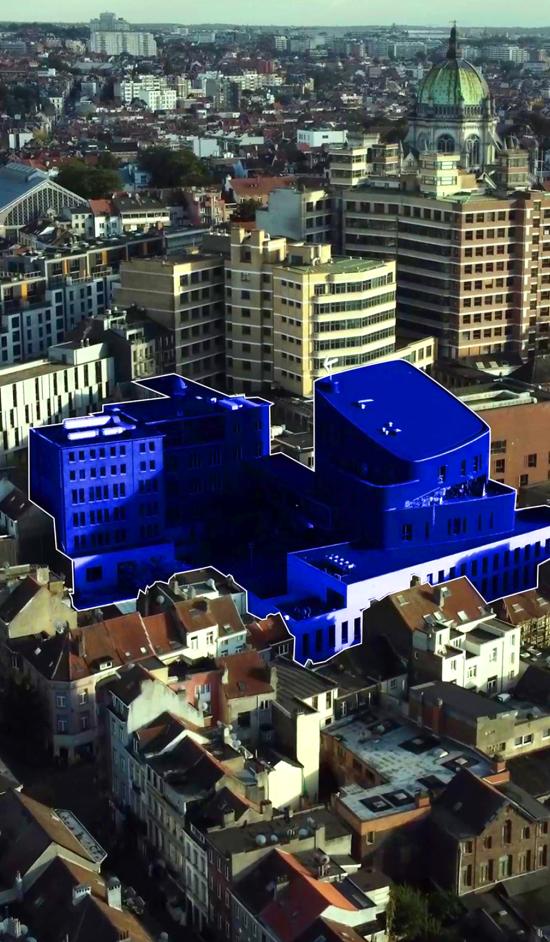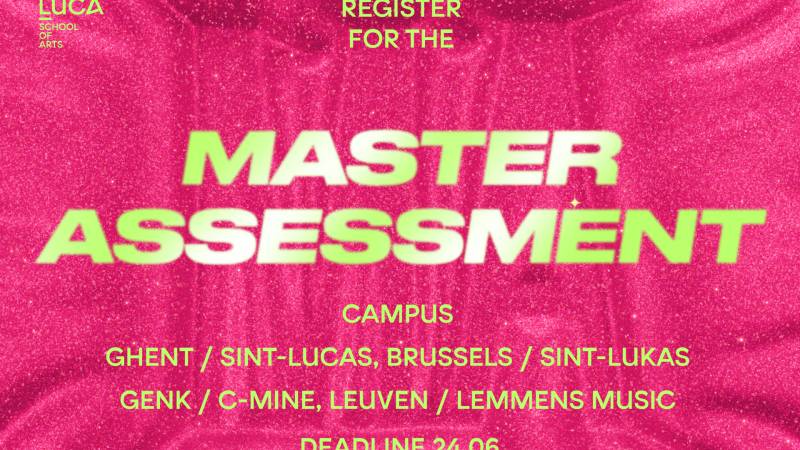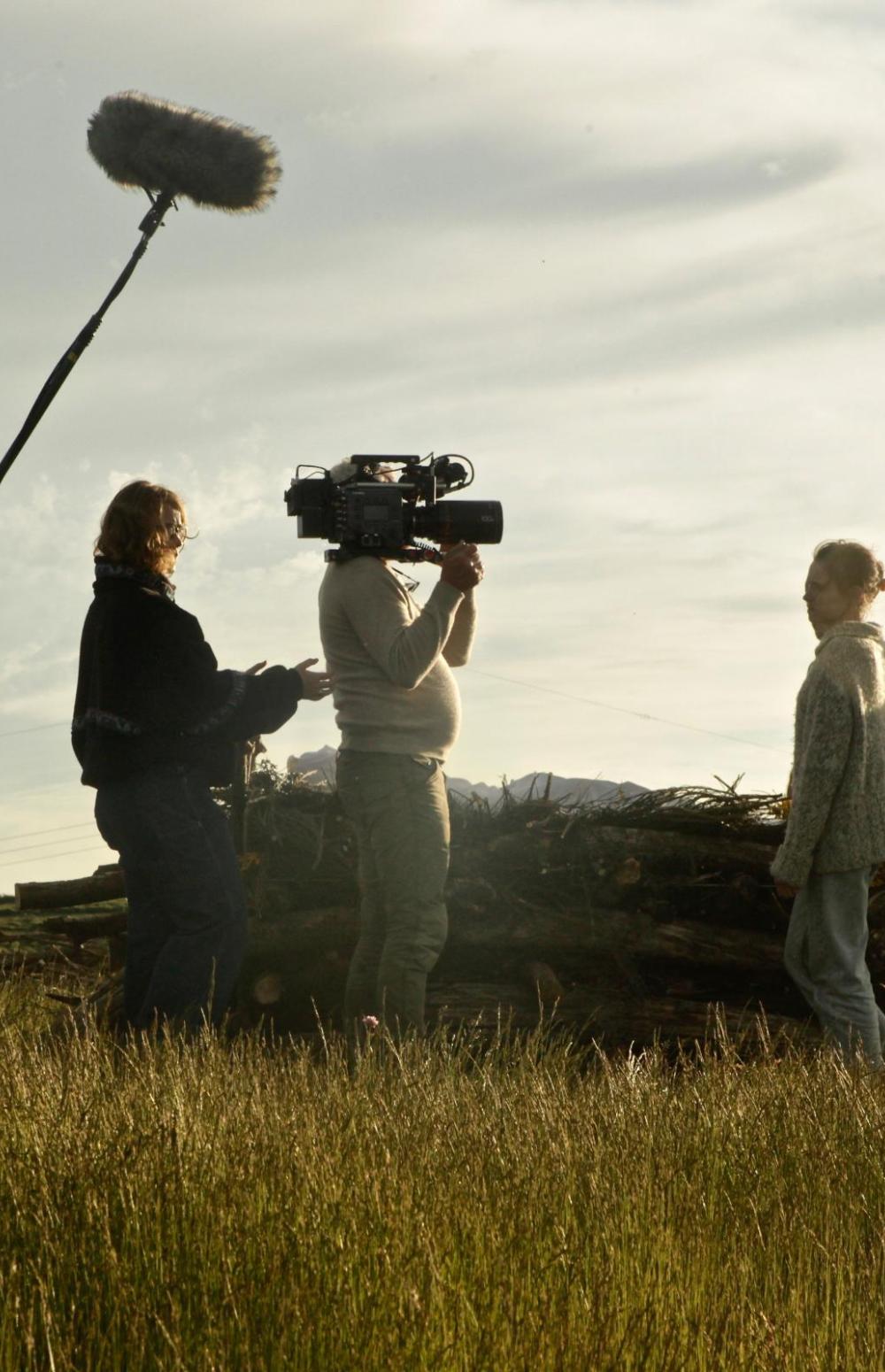
Campus Brussel / Sint-Lukas
Filmmaking in Brussels
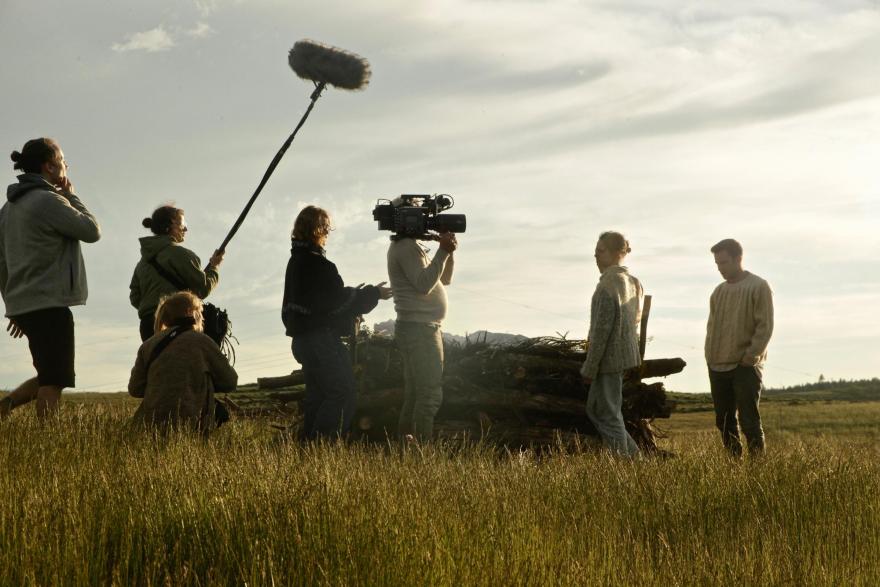
The MA program in Filmmaking offers a one-year, full-time arts education program. Its goal is to build the profile of an independent and professional film maker/artist whose understanding of contemporary cinema culture is informed by a strong sense of aesthetics and ethics. The student’s individual practice is the basic point of reference throughout the program and leads to the graduation project that includes both an audiovisual work and a written essay.
The program puts great emphasis on the interaction between the school’s input and the student’s contribution. It builds on skills gathered in a Film or Audio-visual Arts Bachelor Program and offers no specific training anymore in terms of acting directing, lighting, editing, script writing and so forth. Within the broad framework of cinema (including arthouse film, artist’s film, diverse documentary practices and non-generic mainstream moviemaking) it offers instead a continuous program of mandatory activities that includes workshops, seminars, lectures, presentations by visiting filmmakers and visual artists, group presentations, group discussions, film screenings and excursions to exhibitions that offer a wide range of ideas and positions from the contemporary field of cinema culture and audio-visual arts.
Students contribute their own knowledge, sensitivities, skills, aspirations, motivation and commitment. In regular peer to peer meetings, they report and communicate with each other on the progress of their graduation project. By using this input and through ongoing dialogue with tutors, lecturers and fellow students, they develop a critical vocabulary and learn to formulate adequate artistic research questions and responses as well as to reach solutions independently, culminating in the showing of a personal and creative finished audio-visual work where they demonstrate a personal signature as well as the mastering of directing skills.
Mars, Oman, Vanessa del Campo - selected by Visions du Réel 2019
The program is designed to take a closer look at the problems and possibilities that arise when students/future filmmakers develop a work of art. It does not discriminate between narrative or documentary or experimental cinema practices. On the contrary, it helps students position themselves in the film practice(s) of their choice and achieve their artistic intentions by understanding the achievements of others. It lets students understand the strategies and tactics as well as knowledge and skills involved in the production of audio-visual artwork. Individual practice is at its very centre: a continuous and independent working pattern that seeks a dialogue with similar as well as different practices. In this process, the students can rely on a dialogue about the work’s practical and technical dimensions as well as about content matter with personal tutors.
The program is part of LUCA School of Arts. It stimulates interaction with the departments on our campus as well as those from LUCA-campuses in Leuven, Ghent and Genk.
Students research film and animation cultures as well as visual arts and media histories, and their socio-historical contexts. They develop writing and speaking skills that enable them to express themselves in a critical and nuanced way about their own and other people’s works. The sharpening of cultural knowledge and sensibilities is geared towards the students’ film practices within a research framework that favours the complementarity of classroom and film set, of theory and practice, of thinking and doing.
Trailer Sons of No One, Hans Vannetelbosch - VAF Wildcard Fiction winner 2017
Seminars
Seminars are an integral part of the master's program. LUCA has a particularly rich and diversified range of research seminars fed by the research groups of our campuses from Brussels, Ghent, Genk and Leuven. Each campus has its own researchers, research traditions and disciplines.
Together with your coordinator, you will select two seminars that match your ambitions. You can also choose from the courses given at the KU Leuven or its associated university colleges.
First of all, you need imagination and perseverance. We seek independent students who are interested in filmmaking, who are curious about cinema culture and the audiovisual arts, who are eager to learn and who enjoy working hard. It is not necessary for you to have skills in filmmaking beforehand. And you don’t need to own a camera or other hardware. You have access to a film studio, editing suites and an in-house service offering a wide and updated selection of filming, lighting and sound equipment, all available for check-out through online booking. You have membership to an extensive library containing an up to date section on image culture and audiovisual arts.
Interested in this course?
Enrollment procedure
The application and enrollment procedure at LUCA School of Arts consists in general of three steps.
- First you will have to submit an online Admissions application in which you will be asked to upload certain documents required for the Admissions’ diploma and language check. We will be checking if you meet with the diploma and language requirements.
- The second step continues with your participation in a Master Assessment.
- Step three is the final and binding (online) registration (for which you will receive a unique registration link after succeeding the Master Assessment).
Do you want to start a Master's degree at LUCA?
Then you must pass the MASTER ASSESSMENT
Where do you have class?
Facilities & campus life
Campus Sint-Lukas Brussels
Paleizenstraat 70
1030 Brussels
+32 2 250 11 00
An international campus and an added value to your programme
- A modern and open campus in one of Europe's foremost artistic hubs
- Studio's and workshops, a state of the arts lending service, high tech print rooms …
- A creative community with four educational institutions and over a thousand artist and designers
- An art library renowned for its collection in the country
- At walking distance of the Brussels North railway station
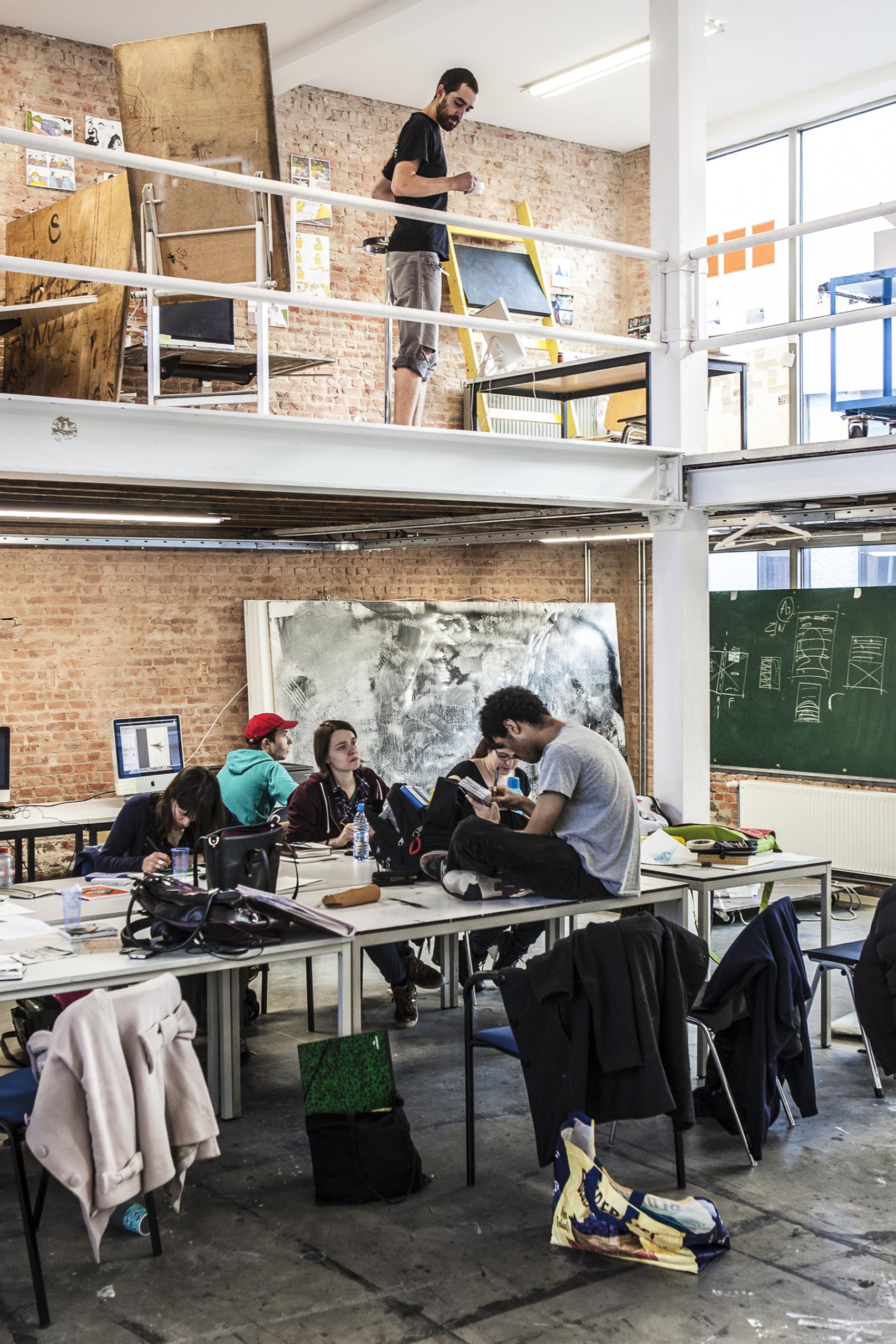
The MA program is located on the Sint-Lukas Campus in the city of Brussels. The capital’s patchwork of languages, cultures and religions, this complex and captivating European metropolis, is the school’s home base as well as its students’ base of operations.

At LUCA we attach great importance to the quality of our courses
If the basic principle of the policy plan means that 'quality is our driving force', and that every aspect of the policy can be tested against this, then LUCA undeniably wants to develop and nurture a strong quality culture: a culture that leaves based on trust in people with talent and expertise, and which is aimed at valuing, inspiring and improving.
The formal quality framework for training within LUCA was named KOPERA, which stands for: Critically Analyzing the Quality of Training with Peers in Own Direction.
For KOPERA, LUCA starts from a vision of quality care that is based on trust and aimed at valuing, inspiring and improving.
During the six-year KOPERA cycle, each training course receives a panel of critical friends who examine the implementation of the quality characteristics and examine how the training contributes to the general LUCA policy.
The final element of KOPERA is the ultimate assurance of training quality. The key question is: "Does the program have a good quality culture that follows the 'plan-do-check-act' circle?"
LUCA publishes a quality sheet for each course. You can find this on the Education Quality page.
Throughout your study trajectory, you acquire a wide range of expertise relating to film directing, such as acting directing, writing for film, dramaturgy, scenography, image and sound editing and film production. In short, you learn how to conceive and make a film from a to z, with you at the controls as creative center. This set of professional artistic competences includes the ability to manage and execute a complex film/art/media project as well as to communicate during the different stages of its completion process. The academic program equally permits you to learn how to relate your film practice to contemporary cinema discourse and critical theory. You acquire a vocabulary as well as a conceptual frame that enables you to develop both speaking and writing skills. Upon graduation, these abilities to both create and reflect give you access to the audiovisual professional field in its broadest sense, working in front and behind the scenes.
Alumni
Throughout decades, the LUCA-Sint Lukas film program has developed a strong reputation delivering many alumni who belong, each in their own way, to the top of the Flemish as well as the international cinema, art and television world:
- Filmmakers Bas Devos (Ghost Tropic), Fien Troch (Home), Sofie Benoot (Victoria), Adil El Arbi en Bilall Fallah (Black, Patser, Bad Boys for Life), Patrice Toye (Muidhond), Dorothée van den Berghe (Rosie & Moussa), Sahim Omar Kalifa (Zagros), Robin Pront (D' Ardennen), Juanita Onzaga (Our Song To War)
- Tv-makers Tim Mielants (Peaky Blinders), Jonas Govaerts (Tabula Rasa), Gilles Coulier (Bevergem, De Dag), Nathalie Basteyns & Kaat Beels (Beau Séjour, Clan), Guillaume Graux (Spul), Arnout Hauben (Ten Oorlog)
- Visual artists Anouk De Clercq, Kurt d’Haeseleer, Floris Vanhoof
- DOP Frank van den Eeden (Girl, De Patrick)
- Screenwriters Sanne Nuyens & Bert Van Dael (De Twaalf)
- Editor Nico Leunen (Rundskop, Beautiful Boy)
- Producers Antonino Lombardo, Frank Van Passel, Marc Goyens
Visit us
Are you curious about our approach to art education? During our open days, you will get all the information you need, visit the campus, talk to our teaching staff and students ... Still not convinced? Visit our graduation show! During this, on-campus two-day art festival you can experience first hand how good our students really are.
Watch student films
Watch the full range of films throughout the program, from 1BA to Master
The core staff of the program consists of practicing filmmakers and film scholars. Teacher and tutors include Herman Asselberghs, Sofie Benoot, Gerard-Jan Claes, Robbrecht Desmet, Bas Devos, Leni Huyghe, Maaike Neuville, Frederik Nicolai, Emmy Oost, Johan Teirlinck, Dorothée van den Berghe, Tom Van Imschoot, Pascal Vandelanoitte, Joeri Verbesselt.
Visiting artists and guest teachers are an integral part of the multifaceted program: since 2017, masterclasses were held by Olivier Assayas, Kevin Jerome Everson, Virgil Vernier, Pieter Dumoulin & Timeau De Keyser, Marine Hugonnier, Johan Grimonprez, Michael Roskam, Daniel Hui, Patrick Keiller, and Bertrand Bonello.
Trailer Muidhond, Patrice Toye, 2019
Trailer Ghost Tropic, Bas Devos, 2019
Trailer Victoria, Sofie Benoot, 2020
